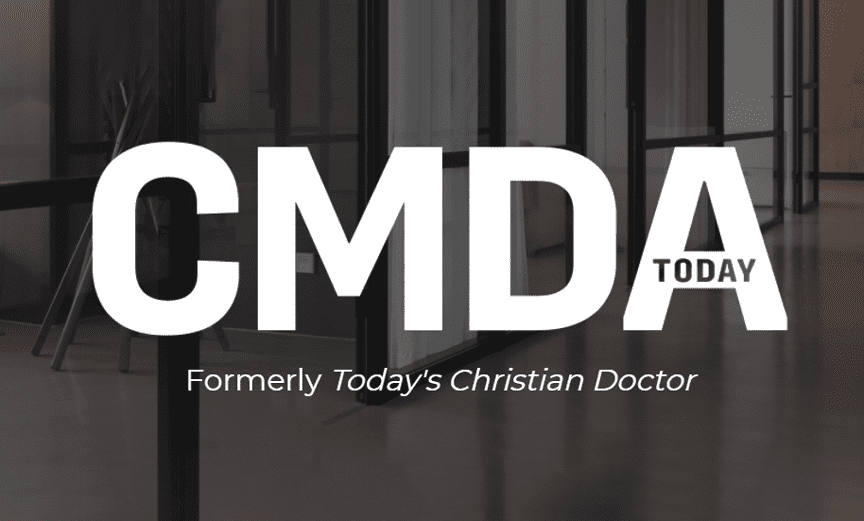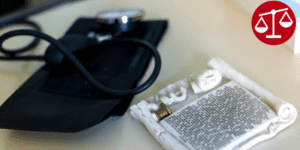
Grasping The Sword
My father played a major role in my own walk with Christ and spiritual growth during my formative years, even as I experienced medical school and residency training. He constantly encouraged me to incorporate the spiritual disciplines of scripture memory and meditation in my life.

by Mike Chupp, MD, FACS
This edition of CMDA Today includes our newest CMDA position statement, “Medical Futility and The Good of The Patient,” which was reviewed by our Board of Trustees in their January 2024 meeting. The timing for this review was providential for me and my family as my father, Ray Chupp, was being treated in a neurocritical care unit of a large teaching hospital in Greenville, South Carolina at that time. My dad developed a tumor of his pineal gland and subsequent CSF obstruction and hydrocephalus. On January 3, 2024, his mental status suddenly deteriorated, and my mom called 911. His course was complicated by pseudomonas aeruginosa ventriculitis, after a decompression catheter was placed by a neurosurgeon. Unfortunately, Dad’s level of consciousness never returned to normal during his 58-day NICU stay. As the only physician in my family, my mother and siblings looked to me as the mediator between the NICU team and our family as we considered medical and surgical options to relieve hydrocephalus. On many occasions, the highly competent and experienced intensivists talked with me about what they felt constituted appropriate care for an 82-year-old like my dad (who was still working part-time as a consultant engineer). While my family and I didn’t always agree with the recommendations coming from his care team, this CMDA statement provided relevant talking points for me with that team right up until his death on March 11. I know that you also will find it a highly useful guide for conversations with family and colleagues as you care for patients who face end-of-life care decisions with their families.
My father played a major role in my own walk with Christ and spiritual growth during my formative years, even as I experienced medical school and residency training. He constantly encouraged me to incorporate the spiritual disciplines of scripture memory and meditation in my life.
Dr. Jake Morris, an emergency medicine physician, missionary in Papua New Guinea and former resident trustee for CMDA, has written an excellent article on the why and how of scripture memorization. Over the last eight years that I have served in leadership at CMDA, I have met dozens of godly men and women in healthcare, just like Dr. Morris, who are champions for bringing the hope and healing of Christ to the world through their professional lives. A unifying theme for many of them is their dedication to hiding God’s Word in their hearts. Proverbs 22:17-19 has been for me an ongoing admonition to not only know about God’s word but to have it ready to share from my lips at a moment’s notice: “Listen to the words of the wise; apply your heart to my instruction. For it is good to keep these sayings in your heart and always ready on your lips. I am teaching you today—yes, YOU—so you will trust in the Lord” (NLT, emphasis added). Applying our hearts to the Word with a readiness to share it verbally with others is a necessary part of trusting God, according to Solomon. Dr. Morris’ testimony is that over the last 10 years, “I have seen a gradual but profound change in my thinking as God’s Word more and more permeates my thought life.”
As Christian healthcare professionals, we have already invested so much time and mental energy in memorizing a plethora of principles and clinical pearls, as well as facts and stats to share with our peers and patients. We do this to make us better physicians, dentists, nurse practitioners, physician assistants, physical therapists, healthcare executives, etc. This knowledge will all pass away eventually but the living and active Word of God is eternal! One of the most sobering admonitions of Christ for me is his foretelling of what the end times will be like in Matthew 24:10,12 “At that time many will turn away from the faith and will betray and hate each other…Because of the increase of wickedness, the love of most will grow cold” (emphasis added). I am sure when most of us read “most” in this passage, we don’t see ourselves in that company but most equals most! I believe you will find the Dallas Willard quote shared by Jake to be a powerful admonition to intentionally commit more of God’s Word to memory. Four years ago, the Holy Spirit reminded me I had hidden a large part of the New Testament in my heart during high school, college and medical school but then life got busy, including 20 years as a medical missionary. God gave me a new 10-year plan of scripture memory that has been transformational. Thank you, Dr. Jake Morris, for challenging us to grasp God’s Word as never before!










